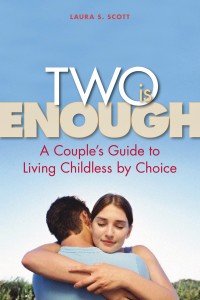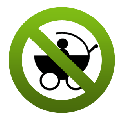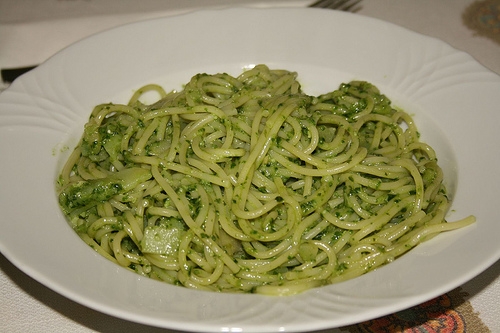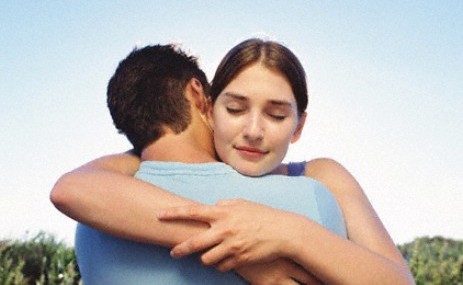 Laura S. Scott has surveyed and interviewed more than 170 people for her Childless by Choice Project. “I’m keenly interested in the process of decision-making,” she says. “How do we get from assuming parenthood for ourselves to the point where we’re saying, ‘No kids, thank you!’?” She shares what she’s learned in a new book, Two Is Enough: A Couple’s Guide to Living Childless by Choice, and in a forthcoming documentary.
Laura S. Scott has surveyed and interviewed more than 170 people for her Childless by Choice Project. “I’m keenly interested in the process of decision-making,” she says. “How do we get from assuming parenthood for ourselves to the point where we’re saying, ‘No kids, thank you!’?” She shares what she’s learned in a new book, Two Is Enough: A Couple’s Guide to Living Childless by Choice, and in a forthcoming documentary.
I called Scott to find out whether environmental concerns were a factor for many of the people she spoke with — and we also got to talking about whether the feminist movement is supportive of childfree women, how a nurturing instinct is different from a maternal instinct, and why we shouldn’t try to save Social Security as we know it.
—–
Q. How many of the people you talked to mentioned environmental issues as a reason not to have kids?
A. I was trying to find the top six most compelling motives to remain childless. The environmental motive was not among that top six, but it showed up fairly regularly in the mix of motives. In a questionnaire, I asked people an open-ended question: “I remained childless by choice because I believe ___.” The motive that was most frequent was, “I don’t feel the desire. I believe you shouldn’t have a child unless you feel a desire to have a child.” Then other frequently cited belief systems included, “The world is already overpopulated. I believe that the world does not need another child.”
Even though [the environment] didn’t come out as the most compelling motive for the group, it was the most compelling motive for a number of people. I interviewed people who felt very strongly that if they were going to be responsible global citizens, they needed not to have children. I talked to a couple in Canada and [the woman] said to me, “As much as I love the potentiality of a newborn, I don’t think the planet needs another garbage-producing human.” Her partner actually wrote himself a letter the week he was going to get a vasectomy, making a list of reasons why he got snipped. The No. 1 reason was that the world is overpopulated and Mother Earth’s problems are a result of too many humans.
Q. When a person is thinking about whether or not to have a child, environmental concerns might break down in two ways: There’s concern about overpopulation and that a child will cause environmental damage and use resources and worsen climate change. And then you might be concerned about bringing a child into a polluted and crowded world that’s going to be a less pleasant place to live. Did you hear from people on that latter point?
A. There is that too. There was worry that we’ve messed up this planet so badly, is it really fair to bring this little person into it? And I think “environmental,” more broadly, is not just a distressed planet, but also the social ills that might threaten the environment [in which you raise] a child, whether it be crime or drugs or sexual promiscuity.
But it was more of the former that I heard about. There was a guilt aspect. Some people said, “You know, we really messed up this planet and I feel guilty bringing a child into this place.”
People who I interviewed thought long and hard about what it would be like to be a parent in this day and age, and it didn’t look like a pretty picture to them. They didn’t have a lot of faith that they would be the parent they really wanted to be based on the stressors that were out there for parents.
Q. Were people who cited the environment as a reason younger or older?
 If you like this article, you’ll love my piece on being a GINK: green inclinations, no kids
If you like this article, you’ll love my piece on being a GINK: green inclinations, no kids
A. I got it across the board. I saw slightly more of the 20- to 29-year-olds expressing concerns about the environment, but only slightly. I anticipated that I would see more people concerned about the environment who were children of the ’70s, when we had that zero-population-growth movement. There was a time, in the ’70s and even in the early ’80s, when it was totally cool to be childfree, particularly if you were in environmental-activist circles. But I think this next generation, anyone born after 1980, is going to be much more aware of environmental concerns because we’re doing a better job of educating children about global sustainability.
I was influenced after the fact. I made the decision not to have children in my late teens, early 20s, and environmental motives were not among my primary motives. However, as I grew to be an adult, I became much more conscious about environmental concerns. I read Bill McKibben’s book Maybe One and was incredibly influenced by it, to the point where I felt myself nodding on every page, saying, “This guy is so right!” and thinking, “Wouldn’t it be great if everyone had a chance to read this book and really think long and hard about how many children they bring into the world?”
Q. In your book, you mention meeting an older woman who asks you whether you have kids, and you tell her you’ve chosen not to, and she responds, “Back in my day we didn’t have a choice.”
A. The choice to remain childless didn’t really exist even 50 or 60 years ago. Birth control methods were really dodgy and not particularly safe or accessible or widely available to most people. And there were laws on the books against using contraceptives if you were married, even until the 1960s in the United States and Canada. The fact that you can as a couple choose to remain childless and you can take the steps to ensure that you do not have children and you can do it safely and you can do it legally — this is new!
Q. Maybe the culture hasn’t caught up with this dramatic shift?
A. That’s very true. The assumption that everyone will have a child at some point in their life and it will all be good and happy — that still has a lot of power. People who make the alternate choice are really swimming against the tide, and their decision-making is not endorsed or understood or accepted in a lot of communities.
It used to be that you went from high school to marriage to children and the question was, “How many children are we going to have?” And that question has morphed into, “Should we have children?” As you delay marriage and child-rearing into your 30s and perhaps even your 40s, you come to appreciate a childfree life. Then that fertility deadline hits, particularly for women, and you go, “OK, gosh, if I’m going to have kids, I really need to think about it. Do I need to look at my partner as a possible father for my children? Am I going to find a new house that I can raise a family in? Or am I going to refill that birth-control prescription?” And then you are a decision-maker — you’re no longer assuming kids for yourself.
Q. Do you think there’s more pressure on women than on men to become parents? Or do women feel it more acutely?
A. I think females do feel it more acutely, and the reason is that having children, being a mother, is so tied to the female identity, more so than to the male identity. People I interview will say, “People don’t think you’re a real woman unless you have a child.” There’s that sense that others are thinking, “Well, she’s not really going to be fulfilled as a woman, or empowered as a woman, or empathetic as a woman if she doesn’t experience parenthood.”
Studies have clearly shown that voluntarily childless women do experience incredibly good well-being and do have a great quality of life and are experiencing the full range of Maslow’s hierarchy of needs — that self-actualization that we all hope and pray for. But then there’s that niggling suspicion, especially from women who have children, that this can’t be legit, that childfree women are in denial and are going to regret it and are going to feel lonely and isolated and have a very poor quality of life. I think there’s a sense that a man in the world will do fine without children, but a woman in the world without children is going to face some tragic end.
Q. Do you feel like the feminist movement — not that there’s some monolithic movement that you can pin down — but do you feel like it’s supportive of the choice not to have children? Or is it really focused on helping women balance work and children?
A. Women who choose to remain childless really haven’t been embraced in that umbrella of modern feminism. Maybe earlier, in the ’70s, when we did have a very strong environmentalist movement, the childfree choice would have been embraced within the feminist movement. But I don’t see that in this sort of neo-feminist movement that we have now. The focus really is on working moms. I think that will change as the numbers of women who remain childless increase. Now, in 2010, close to 20 percent of women don’t have children and will never have children.
Q. A number of the people you interviewed in your book work with or volunteer with kids. Do you think it’s a disproportionately high number compared with the rest of the population?
A. Maybe, because we have time. Frankly, I don’t think I would have mentored had I been a parent — I just wouldn’t have had the time nor the interest. When you parent, your focus is justifiably on your own children; they tend to consume a large portion of your disposable income and discretionary time. The reason why I think so many of the childfree are engaged in volunteerism, and especially volunteering with youth, is because they can. Many of the people I’ve interviewed emphasize that just because we’re childless by choice doesn’t mean that we’re without children in our lives. Our choice is to have nieces and nephews in our lives, to be able to mentor and to be able to volunteer in the community with children.
I was quite surprised when I was doing the research for the book how many people I came across who were teachers. These were people who had chosen careers that would put them in daily contact with children, and they loved their jobs. But on the other side, they’re saying, “I’m so glad I’m childless by choice, because I don’t know how, after spending eight hours with 30 kids, I could come home to a houseful of children. I would be overwhelmed.”
I think there’s an understanding among the childfree that if you choose, you can have children in your life, and if you don’t choose, you don’t have to. There’s that incredible freedom to create a family of affinity versus a family of blood — what we call the tribe. The childfree are very adept at creating tribes because they know that if they want to have a good quality of life surrounded with people who love them and who they love, they need to seek out people who can function as a de facto family, and some of those people might be little people.
Just because you’re childless by choice doesn’t mean you don’t have a sense of nurturing. I’ve had a lot of people tell me, “I don’t think I have a maternal instinct, but I have a nurturing instinct.” That nurturing instinct could be expressed by nurturing my community or nurturing my pets or nurturing my spouse. I think there’s an assumption that if you don’t have children, you must be this cold-hearted, isolated, curmudgeonly person. I don’t see evidence of that with the people that I’ve interviewed.
Q. How do you respond when someone says it’s selfish not to have kids?
A. I question how they define selfishness, because to me, selfishness implies a victim. So who am I victimizing if I don’t have a child? Unless my parents anticipated a grandchild and didn’t get one, I don’t see that my choice not to have a child negatively impacts anyone else.
I think people see a lifestyle that maybe involves travel or time alone and hobbies, and parents might look upon that and go, “Well, you’re self-indulgent or you’re selfish because your activities are more self-oriented.” And that might be true. Some people think it’s a bad thing to take that time for yourself in isolation or go on a hike.
But I don’t see selfishness played out in the sense of, “I’m childless by choice because I want to go out to clubs until 3:00 in the morning,” or “I want to save every penny I make and not have to spend it on anyone else.” In fact, I see a lot of volunteerism, I see a lot of people donating time and money to charitable organizations, and I see a lot of people chipping in to help their nephew go to college. That selfish label just really doesn’t stick.
Q. There’s an argument that we need to have kids in order to keep Social Security going, that we need more young people to support all the older people. There’s all this worry about demographic shifts in Europe, that they don’t have enough children being born.
A. It’s like breeding workers. That kind of thing [is] a very scary assumption, that we can breed our way into well-being as a nation. I don’t think the evidence supports that. To save Social Security, we would have to have, according to Bill McKibben, at least three kids on average, which would, in a few generations, produce a population approaching China’s. From all I’ve read, it just doesn’t make any sense.
It’s ridiculous that we’ve been able to double the [world] population in such a short span of time. But certainly we can’t afford to double the population again. I don’t think the earth will support that. I think it’s in everyone’s best interest if we find a way to plateau our population so that we do have a good quality of life. It may not include Social Security benefits. But it will be a world in which we might be able to feed ourselves and might have enough fresh water on the planet for everyone. That would be a nice world to live in.
—–
Read more about population and the childfree option:
- The GINK manifesto: Say it loud: I’m childfree and I’m proud
- Childfree messages in Sex and the City 2 and Eat, Pray, Love
- Pundits criticize Elena Kagan for being childfree
- Women’s rights are the right way to approach the population issue
- Nearly a fifth of American women skip childbearing
- Want to join the Voluntary Human Extinction Movement?
- And still more about population




